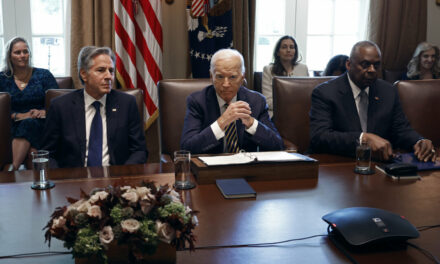We support our Publishers and Content Creators. You can view this story on their website by CLICKING HERE.
The apparent attack targeted the battleground state’s absentee ballot portal.
Georgia officials thwarted an attempt to flood the state’s absentee voter portal in an apparent attempt to crash the site, the secretary of state’s office said on Wednesday evening.
The attack was limited to the part of the state’s website that voters use to request an absentee ballot. Users may have experienced a brief slowdown, but the site never crashed and no data was compromised, said Gabriel Sterling, the chief operating officer in the Georgia Secretary of State’s office.
He said it was not clear where the attack originated. There has been no public indication that similar systems in any other state were subject to the same kind of attack, and federal government agencies have not offered public comments on the alleged incident.
In the incident, Sterling recalled, at least 420,000 IP addresses were trying to access the site at the same time, which appeared to be anomalous. The office then implemented a verification system that required users to offer proof they are human, he said.
After the verification was imposed, the traffic “just sort of fell through the floor,” Sterling said. Everything was back to normal within 30 minutes, he said.
“These different login attempts were from all over the globe. I mean from Indonesia, Brazil, United States, Vietnam, Japan, Thailand,” he said. “Many of these entities and these computers have been used in previous attacks around the world.”
The Epoch Times contacted the U.S. Cybersecurity and Infrastructure Agency (CISA) and the Georgia Secretary of State’s office for comment.
Foreign adversaries may still try to promote “false or misleading narratives” to sway the election or to undermine U.S. confidence in its election systems and processes, the agencies said.
They said that foreign actors are using AI, or artificial intelligence, to “develop and distribute more compelling synthetic media messaging campaigns and inauthentic news articles” as well as “deepfakes” ahead of the election, adding that synthetic messages and images have been spread across numerous U.S.-based platforms.
With about 12 days to go before the Nov. 5 election, Trump and Vice President Kamala Harris honed in on their closing messages with a series of rallies across multiple swing states.
The former president will be holding rallies in Tempe, Arizona, and Las Vegas, Nevada, on Thursday. Trump is also planning to make a stop in Austin, Texas, to appear on podcast host Joe Rogan’s popular show on Friday, and he will also hold a rally there.
The vice president plans to hold a rally Thursday night in the Atlanta suburbs with former President Barack Obama and longtime singer Bruce Springsteen. Aside from battleground states, Harris will visit Houston, Texas, with a speech that will focus on abortion.
The Associated Press contributed to this report.

 Conservative
Conservative  Search
Search Trending
Trending Current News
Current News 







